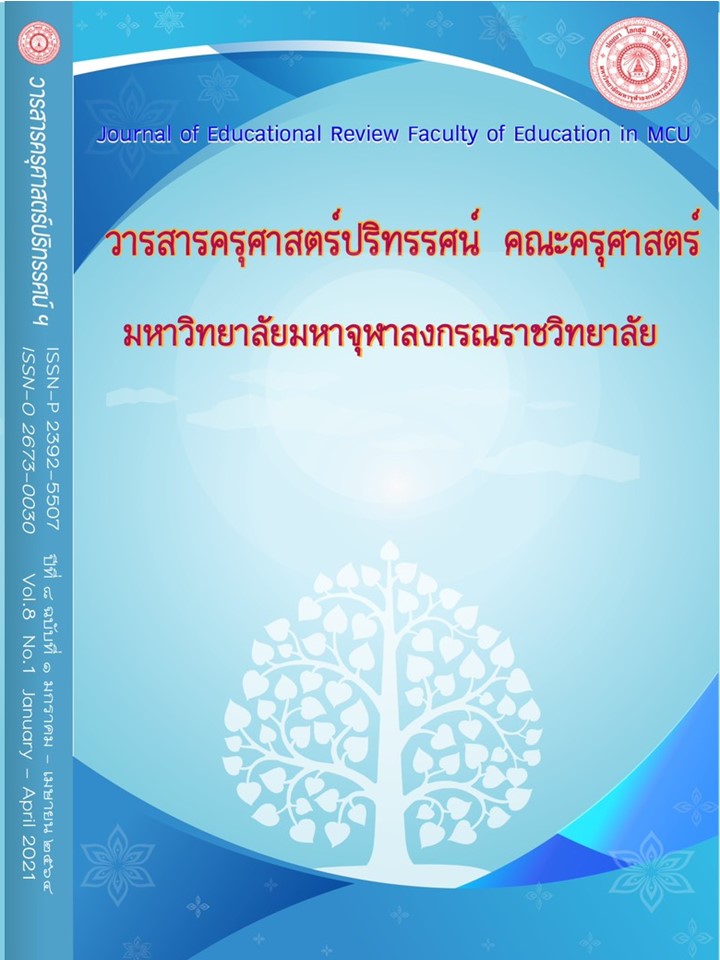THE DEVELOPMENT OF SCHOOL ADMINISTRATION ACCORDING TO GOOD GOVERNANCE SYSTEM OF SECONDARY SCHOOL ADMINISTRATORS IN CHON BURI PROVINCE
Main Article Content
Abstract
The purpose of this research was to propose school administration according to good governance system of secondary school administrators in Chonburi Province. It is a mixed research method and there are 3 research steps: Step 1: Study the current condition of the school administrators of secondary school administrators in Chonburi Province using questionnaires with 341 high school administrators and teachers, data were analyzed by statistical data such as frequency, percentage, mean, standard deviation. Step 2: developed the system by interviewing 10 key informants, and Step 3: propose school administration according to good governance system of secondary school administrators in Chonburi Province with focus group discussion of 10 experts. The findings were found that school administration system according to the good governance principles of secondary school administrators in Chonburi Province consisted of 5 parts: 1) inputs, 4 administrative principles and principles of good governance. 2) Process, 11 aspects of school administration process and administration and manage the school according to the principles of good governance. 3) Results or productivity exact purpose administrative resources, and there is coordination with each other for efficiency and effectiveness. There are goals, management factors and the nature of the management, division of labor, supervision, supervisory line payments for incentives and principles of management development, preparation, change, improvement or reform of the environment Principles of management for development by bringing competencies, or the existing capabilities in the management system into action. 4) Impact feedback, characteristics of administrative policies and practices, nature of the environment, Personnel characteristics, nature of the organization. 5) Environment, external environment and internal environment of the organization.
Article Details
ทัศนะและความคิดเห็นที่ปรากฏในบทความในวารสารฉบับนี้ถือเป็นความรับผิดชอบของผู้เขียนบทความนั้นเพียงผู้เดียว และไม่ถือเป็นทัศนะและความรับผิดชอบของกองบรรณาธิการ
กองบรรณาธิการขอสงวนสิทธิ์ในการคัดเลือกบทความลงตีพิมพ์และจะแจ้งให้เจ้าของบทความทราบหลังจากผู้ประเมินบทความตรวจอ่านบทความแล้ว
ต้นฉบับที่ได้รับการตีพิมพ์ในวารสารครุศาสตร์ปริทรรศน์ คณะครุศาสตร์ มหาวิทยาลัยมหาจุฬาลงกรณราชวิทยาลัย ถือเป็นกรรมสิทธิ์ของคณะครุศาสตร์ มหาวิทยาลัยมหาจุฬาลงกรณราชวิทยาลัย ห้ามนำข้อความทั้งหมดหรือบางส่วนไปพิมพ์ซ้ำ เว้นเสียแต่ว่าจะได้รับอนุญาตจากมหาวิทยาลัยฯ เป็นลายลักษณ์อักษร
References
กระทรวงศึกษาธิการ. (2546). พระราชบัญญัติการศึกษาแห่งชาติ พ.ศ. 2542 และที่แก้ไขเพิ่มเติม (ฉบับที่ 2) พ.ศ. 2545. กรุงเทพมหานคร: กระทรวงศึกษาธิการ.
กระทรวงศึกษาธิการ. (2560). แผนพัฒนาการศึกษาของสำนักงานปลัดกระทรวงศึกษาธิการ ฉบับที่ 12 (พ.ศ. 2560-2564). แหล่งที่มา http://www.moe.go.th สืบค้นเมื่อ 24 ม.ค. 2560.
จันทรานี สงวนนาม. (2545). ทฤษฎีและปฏิบัติในการบริหารการศึกษา. กรุงเทพมหานคร: บุ๊คพอยท์.
พระมหาวินัย สิริภทฺโท (แช่มสายทอง), บุญเชิด ชำนิศาสตร์ และพีรวัฒน์ ชัยสุข. (2563). รูปแบบการพัฒนาการบริหารตามหลักธรรมาภิบาลที่มีประสิทธิภาพ สำหรับโรงเรียนประถมศึกษา สังกัดสำนักงานเขตพื้นที่การศึกษาประถมศึกษา. วารสารครุศาสตร์ปริทรรศน์ คณะครุศาสตร์ มหาวิทยาลัยมหาจุฬาลงกรณราชวิทยาลัย. 7(3). 242-253.
พระสุรชัย สุรชโย (หงษ์ตระกูล). (2560). การพัฒนาระบบการประกันคุณภาพการศึกษาของมหาวิทยาลัยมหาจุฬาลงกรณราชวิทยาลัย. ดุษฎีนิพนธ์พุทธศาสตรดุษฎีบัณฑิต. มหาวิทยาลัยมหาจุฬาลงกรณราชวิทยาลัย.
รสสุคนธ์ มกรมณี. (2555). การจัดการเรียนรู้เพื่อสร้างสรรค์ด้วยปัญญา. วารสารการศึกษาไทย. 30(1). 38-40.
วิโรจน์ สารรัตนะ. (2545). กระบวนทัศน์ใหม่ทางการศึกษา กรณีทัศนะต่อการศึกษาศตวรรษที่ 21. แหล่งที่มา http://www.thePartnershipfor21stcenturyskills-youtube สืบค้นเมื่อ 30 พ.ย. 2561.
สำนักคณะกรรมการการศึกษาแห่งชาติ. (2542). พระราชบัญญัติการศึกษาแห่งชาติ พ.ศ. 2542. กรุงเทพมหานคร: พริกหวานกราฟฟิก.
สำนักงานคณะกรรมการการศึกษาขั้นพื้นฐาน. (2551). ข้อมูลสารสนเทศขั้นพื้นฐานทางการศึกษา ปีการศึกษา 2552. ตราด: สำนักงานคณะกรรมการการศึกษาขั้นพื้นฐาน.
สุทธญาณ์ โอบอ้อม. (2557). การพัฒนาศักยภาพบุคลากรขององค์กรปกครองส่วนท้องถิ่นตามแนวพระพุทธศาสนา. ดุษฎีนิพนธ์พุทธศาสตรดุษฎีบัณฑิต. มหาวิทยาลัยมหาจุฬาลงกรณราชวิทยาลัย.


